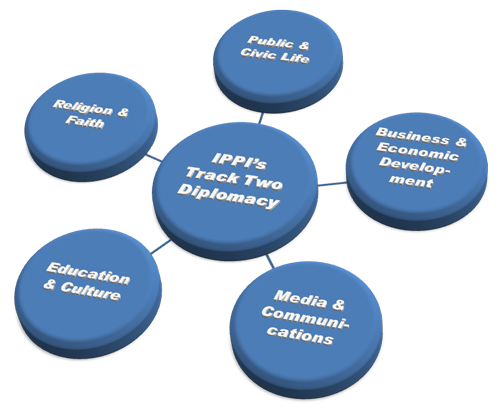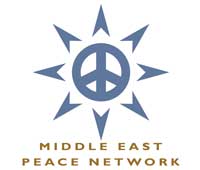Israeli-Palestinian Peacebuilding Initiative (IPPI)
A New Roadmap for Middle East Peace
In the last three decades, there were several attempts to reach a permanent solution to the conflict between Israel and the Palestinians, a dispute believed by many to be the core of the Arab-Israeli conflict. Each attempt has been a good start and one step forward in building bridges between the parties to the conflict. But, as usual, nothing meaningful has happened.
The peace process, from an historical perspective, had neither peace nor process. The IPPI is a response to that unfortunate and unacceptable prolongation. With direct intergovernmental (Track One) negotiations between Israel and the Palestinian Authority broken down, apparently irretrievably, and the negligible chances of their revival in the near future, rather than wait for a new round of talks that in all probability will end, like always, in an anything-but-peace process, nongovernmental diplomacy (Track Two) may be the only way to break out of this stalemate and move the violent conflict into a nonviolent dialogue between Israel and the Palestinians.
Given the deep freeze in Israeli-Palestinian relations and the uncertain environment of shifting sands in the region, it is expected that both the Israeli Government and the Palestinian Authority recognize the “non-threatening” advantages of a non-governmental actor, like the Middle East Peace Network (MEPN), to engage in the peace process “from below.”
The assertion at the core of the IPPI is that the Israeli-Palestinian conflict is intractable, that Track One traditional diplomacy is limited, and that the parties in conflict need once and for all a pre-negotiation phase. During this phase, Track Two nongovernmental intermediaries—using a variety of unconventional methods that “vaccinate” the environment and engage in a peacebuilding process on multiple fronts—will prepare the stage for Track One intergovernmental negotiators to finalize a formal peace agreement. Yes, this process takes more time than traditional diplomacy, and given the creeping reality on the ground, quick-fix solutions are always more desirable. But, there is simply no other way. Obviously, cooperation between Track One and Track Two is crucial for the success of the IPPI, and therefore some of its activities may have to be collaborative, or as often termed, “Track One-and-a-Half.”
The IPPI offers us a detailed plan to accomplish that goal. Specifically, it proposes two stages for the peace process:
- A public peacebuilding pre-negotiation
- An intergovernmental peace-negotiation
During the first stage, the IPPI will be launched in Israel, the Palestinian territories, and Jordan (where over 50% of the population is Palestinian), facilitated by MEPN, in consultation with an international team of professional conflict-resolution experts, in collaboration with local community leaders, and in coordination with the three governments. This initiative at the Track Two level will use peacebuilding methods that are intended to create, in the course of the peace process, an infrastructure of peace in the region, and to generate, in the process, an ”ecology of peace”—a warm climate in which formal negotiations are effective and peace agreements are workable.
The second stage will center on an intergovernmental peace-negotiation process, during which official diplomats representing Track One will take over and enter into negotiations to finalize a formal peace agreement. It is expected that the peacebuilding blocks and the people-to-people interactions at the Track Two level will, by then, have created a sustainable life of their own, and a permanent platform of peacebuilding institutions will, by then, assume the roles of the IPPI.

Only a concrete, formalized, and sincere peacebuilding effort may offer the hope of defusing the tragic and wasteful confrontation between Israel and the Palestinians, creating a new paradigm in which future peace negotiations between their governments are workable, and making the desirable transition to a two-state settlement of their conflict.
To generate this paradigm shift, the IPPI will go through a process of phased implementation starting with peacebuilding from the bottom-up, incorporating multi-track methods (see diagram) into well-structured peace campaigns, and initiate a series of gradually bolder people-to-people projects and communication links that will cover the whole spectrum of society, from the elite leadership, community and religious leaders, and down to the grassroots level, in Israel, the Palestinian territories, and Jordan.
What sets IPPI apart from all previous people-to-people experiences in the region is its ambitious, massive, well funded, politically neutral, effectively organized, locally run, multifront operation directed at the mainstream of society, not only at its liberal or leftist fringes, and that it will be launched systematically over an extended period in cooperation with the governments. That’s the critical difference IPPI makes.
Inviting both Israelis and Palestinians—who together are the beneficiaries of peace and the victims of its absence—to participate in the peacebuilding process, is most natural and noble. Peace is only possible if both societies see it as possible and act on it. Their realization that war can no longer serve its traditional function of settling their conflict, but that peace can, is critical. There is simply no other way but the highway of the IPPI.



